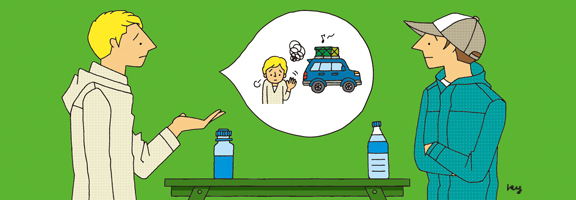会話を学ぶ「英会話講座」
2016.4.13
旅行の計画をキャンセルする

<近いうちに一緒にキャンプに行く予定があるIanとLyleが大学のキャンパスで話しています。>
EnglishJapanese
Ian:Hey, so what was it you wanted to talk about?
Lyle:I guess I should just come clean. I can’t make it to the camping trip.
Ian:Wait, really? We already paid for the space and rented the equipment.
Lyle:Yeah, I’m really sorry. I know it probably throws a wrench into your plans—
Ian:What happened? Why can’t you make it?
Lyle:I have a family reunion at the same time. And I haven’t seen some of my cousins in years!
Ian:Well, you can’t say “no” to a family reunion. But I’m not sure we can get a refund at this point.
Lyle:I understand. I know we planned on going Dutch on the cost of the trip.
Ian:Yeah, I’ll call and check but I’m worried it might be too late to get your money back.
Lyle:If worst comes to worst, I’ll pay my part and someone else can go instead.
Ian:Seriously? That would be a huge help. Thanks!
Lyle:No problem!
Lyle:I guess I should just come clean. I can’t make it to the camping trip.
Ian:Wait, really? We already paid for the space and rented the equipment.
Lyle:Yeah, I’m really sorry. I know it probably throws a wrench into your plans—
Ian:What happened? Why can’t you make it?
Lyle:I have a family reunion at the same time. And I haven’t seen some of my cousins in years!
Ian:Well, you can’t say “no” to a family reunion. But I’m not sure we can get a refund at this point.
Lyle:I understand. I know we planned on going Dutch on the cost of the trip.
Ian:Yeah, I’ll call and check but I’m worried it might be too late to get your money back.
Lyle:If worst comes to worst, I’ll pay my part and someone else can go instead.
Ian:Seriously? That would be a huge help. Thanks!
Lyle:No problem!
Ian:なあ、話って何だよ?
Lyle:白状しないとだめだよな。キャンプ行けないんだ、俺。
Ian:おい、本当かよ?場所代とか、用具のレンタル代とかもう払ってるんだぜ。
Lyle:ああ、本当にごめん。せっかくの計画を台無しにしちゃってるよな、たぶん。
Ian:何があったんだよ?どうして行けないんだよ?
Lyle:親戚の集まりがあるんだよ、その日。何年も会ってない、いとことかもいてさ。
Ian:まあ、親戚の集まりじゃ、行かないわけにはいかないな。でもここまで来て返金してもらえるかわからないな。
Lyle:わかってる。キャンプにかかるお金は半分ずつ出すってことだったよな。
Ian:ああ、連絡して聞いてみるけど、お前の分の返金してもらえないんじゃないかな、もう。
Lyle:まあ、最悪俺が払って、誰かに代わりに行ってもらうよ。
Ian:本当かよ?そうしてもらえると助かるな。ありがとう。
Lyle:いいって。
Lyle:白状しないとだめだよな。キャンプ行けないんだ、俺。
Ian:おい、本当かよ?場所代とか、用具のレンタル代とかもう払ってるんだぜ。
Lyle:ああ、本当にごめん。せっかくの計画を台無しにしちゃってるよな、たぶん。
Ian:何があったんだよ?どうして行けないんだよ?
Lyle:親戚の集まりがあるんだよ、その日。何年も会ってない、いとことかもいてさ。
Ian:まあ、親戚の集まりじゃ、行かないわけにはいかないな。でもここまで来て返金してもらえるかわからないな。
Lyle:わかってる。キャンプにかかるお金は半分ずつ出すってことだったよな。
Ian:ああ、連絡して聞いてみるけど、お前の分の返金してもらえないんじゃないかな、もう。
Lyle:まあ、最悪俺が払って、誰かに代わりに行ってもらうよ。
Ian:本当かよ?そうしてもらえると助かるな。ありがとう。
Lyle:いいって。
キーフレーズ
“come clean (about something)” ~を白状する
正直に本当のことを話すことを意味する表現で、通常は好ましくない内容やできれば話したくないようなことに対して使われます。
例)Benと妻のAngelicaは割れた窓ガラスの前で話しています。
Ben:Are you sure Sam will tell you the truth about what happened?
Angelica:I think he’ll come clean with me. His mother and I are good friends.
Ben:何があったか、Samが本当のこと話すと思う?
Angelica:ちゃんと白状すると思うわ。あの子のお母さんと私は親友なのよ。
Ben:Are you sure Sam will tell you the truth about what happened?
Angelica:I think he’ll come clean with me. His mother and I are good friends.
Ben:何があったか、Samが本当のこと話すと思う?
Angelica:ちゃんと白状すると思うわ。あの子のお母さんと私は親友なのよ。
“throw a wrench into (someone’s) plans” ~を台無しにする
問題などが突然生じて、事前に計画していたことがうまくいかなくなってしまうことを言う際に使われるフレーズです。
例)Jillと友人のOscarはサッカーの試合を観に行くところですが、どうやら電車が遅れているようです。
Jill:The station staff said that the train is going to be delayed at least an hour.
Oscar:Well, that throws a wrench into our plans. The game starts in 30 minutes!
Jill:最低でも1時間は遅れるって駅員が言ってたわよ。
Oscar:うーん、そうなると俺たちの計画が台無しだな。あと30分で試合が始まっちゃうじゃないか!
Jill:The station staff said that the train is going to be delayed at least an hour.
Oscar:Well, that throws a wrench into our plans. The game starts in 30 minutes!
Jill:最低でも1時間は遅れるって駅員が言ってたわよ。
Oscar:うーん、そうなると俺たちの計画が台無しだな。あと30分で試合が始まっちゃうじゃないか!
“go Dutch” 割り勘にする
飲食店などで食事代を全員で負担することを言う際に非常によく使われる表現です。各自が自分の注文したものに応じた金額を支払う場合にも、総額を人数で割って支払う場合にも使うことができますが、欧米では前者のほうが一般的です。
例)AllisonとボーイフレンドのDerrickが高級レストランで食事を終え、支払いをしているところです。
Allison:How do you want to pay the bill? I don’t mind paying.
Wendy:But we had so much food! How about we go Dutch?
Allison:食事代はどうする?ここは僕が払っても構わないけど。
Wendy:でも、すごくたくさん食べたわ、私たち。割り勘でどう?
Allison:How do you want to pay the bill? I don’t mind paying.
Wendy:But we had so much food! How about we go Dutch?
Allison:食事代はどうする?ここは僕が払っても構わないけど。
Wendy:でも、すごくたくさん食べたわ、私たち。割り勘でどう?
“if worst comes to worst” 最悪の場合には
非常に深刻な状況になったり、事態が極めて好ましくない方向に進んだ場合について話す際に使われる表現です。
例)Yvonneと友人のReneeは映画のチケットをオンラインで購入しました。
Yvonne:The movie doesn’t end until 11:45pm. Are you sure we can make our last train?
Renee:Neither of us lives very far from the theater. If worst comes to worst, we can split the cost of a cab.
Yvonne:映画は11:45まで終わらないけど。終電間に合うと思う?
Renee:私たちどっちも、家がそんなに遠くないわ、映画館から。最悪、タクシー代を割り勘にすればいいわ。
Yvonne:The movie doesn’t end until 11:45pm. Are you sure we can make our last train?
Renee:Neither of us lives very far from the theater. If worst comes to worst, we can split the cost of a cab.
Yvonne:映画は11:45まで終わらないけど。終電間に合うと思う?
Renee:私たちどっちも、家がそんなに遠くないわ、映画館から。最悪、タクシー代を割り勘にすればいいわ。


 【Gabaからのお知らせ】
【Gabaからのお知らせ】 【特集】
【特集】 【英単語の正しい使い分け】
【英単語の正しい使い分け】 【使いこなす句動詞】
【使いこなす句動詞】